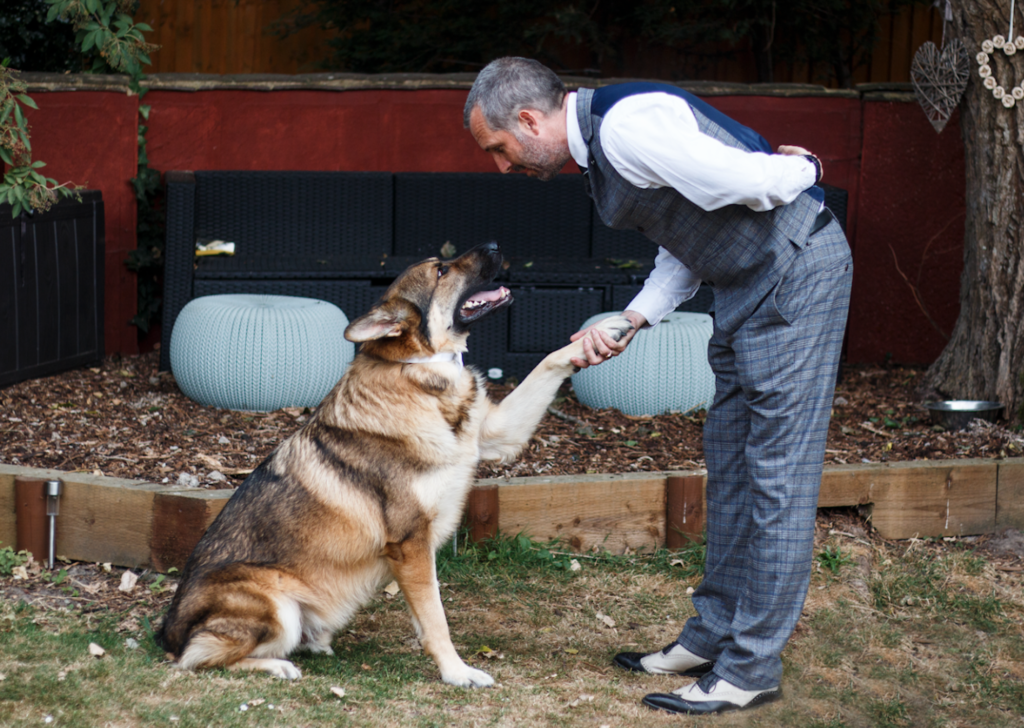
Mark Bridger-Pescott of Bone Canis
Dogs are part of the family.
Research has shown that there are some similarities in relation to the feelings of connectedness that we experience with dogs to those of other human significant relationships. A 2010 study states that ‘ In developed nations, approximately half of household environments contain pets. Studies of Human-Animal Interaction (HAI) have proposed that there are health benefits and risks associated with pet ownership.’ (Westgarth et al 2010) Indeed, many would describe their relationship with their dogs as being ‘Part of the family’. We care for our dogs; engage in activities such as play and ensure that their needs are met. There are many discussions around terminology in describing our relationship too, are we owner, guardians, pet parents or carers?
The notion of ‘it’s only a dog’ is one that many consider to be an unsuitable way of describing the close bond that we feel. The pain experienced by many when they must say goodbye to their dog can be as traumatic as the death of a family member or close friend and in some cases the person is losing a companion, a significant attachment figure, a loved one or their constant companion.
It is unsurprising then that we would want to share some significant events with these important figures in our lives, including attending weddings. A growing understanding of canine behaviour and body language provides us with the information to enable a much more supportive approach when considering whether our canine family members could or would want to be as involved as we may wish.
I posed a few questions to Mark, who has practical experience of his special guests attending the wedding.
You were keen to have your dog involved in your special day; can you explain why this was so important to you?
I have been around dogs all my life; they have always played a large part and I really can’t imagine being without a dog in some capacity. My wife didn’t grow up with dogs but is now a firm fan since we took in our two rescue GSDs!!!
When we decided to get married, we chose to have a very small ceremony: just us with two others to act as witnesses, best man and photographer, so we wanted to include the dogs somehow.
We didn’t take the dogs to the service, but found out afterwards that we could have done (a real shame, but they still played a huge part). However, we did involve them for the rest of the celebrations; they played a big part in our wedding photos and attended our family and friend parties afterwards.
What advice would you give to anyone who wanted to involve their dog or dogs in such an event?
In the first instance you need to decide whether your dog will be happy to attend, or whether they will find it too overwhelming.
Be very mindful of the temperature to ensure that your dog will be happy and comfortable. If you are having a summer wedding, make sure there is plenty of shade and water for the dogs.
Then you need to find a venue that is ‘dog friendly’ – there are many around the country, county councils hold information on whether registry offices allow dogs too. Next, plan to have someone on hand as your pets’ ‘chaperone’, this is so you can relax knowing that someone is ‘looking-out’ for your pet at all times, and your pet is also entertained throughout the day too, so they don’t get too bored. Your chaperone also needs to ensure your dog is happy at any party you may have afterward too – ask them to be mindful of the level of noise at these events and guests’ behaviours around the dog.
There are many pet chaperone companies around the country, they specialise in looking after your pet throughout the whole day, and even during the honeymoon. They will look after your dog at home to get them ready, and then bring them to the venue for the wedding and, if you want, they will look after your dog whilst you go on honeymoon (unless of course you book one of the wonderful holiday homes that allow dogs, and you take them with you). Make sure that the chaperone you choose is qualified, has a very good understanding of canine behaviour ( if possible, qualifications in it too), and is fully-insured.
Decide what role you would like your dog to play… are they your best man? Maid of honour? Ring-bearer? etc. Then make sure they are comfortable and happy doing this. If you are going to use special wedding day collars, make sure they are comfortable and safe. It’s best to not go overboard with dressing your dog up – lots of dogs don’t like this, and we want to ensure that they not stressed.
Please be very aware of what is poisonous to dogs, this includes the flowers and any food being served. You need to be very aware of children who may be eating sweets / wedding favours etc. so the chaperone should be very mindful of who gives the dog/s what. There are resources available to provide lists of plants and food that are known to be poisonous to dogs such as the Blue Cross website Blue Cross
It’s really important to let your photographer know that your dog will be attending, and that they will be in lots of the pictures; the photographer will then arrive fully- prepared.
How would you recognise and reduce any possible stressors?
You will most likely be very stressed yourself and this can feed into your dogs too, so try to relax yourself and enjoy your special day. It goes without saying therefore, that organising everything fully in advance will help to calm you down and feel prepared. It would also help for you and your dog to meet your chaperone before the wedding day, to get to know each other.
Your chosen chaperone should be very aware of your dog’s body language and should be confident enough to let you know when they feel your dog is getting too stressed and have the foresight to take the dog away, if or when they feel this is necessary. Stress can be difficult to identify without close observation but signals such as lip licking, turning away from or avoiding people, tense facial muscles and whale eye are some of the basic areas to be aware of. Of course, it very much depends on the dog and barking, jumping up or showing signs of excessive excitement can also indicate that the dogs is becoming overwhelmed. There are many resources online detailing the classic signs to be aware of.
If you are looking after your dog yourself, then make sure you research the signs of stress in dogs and look out for them all throughout the day. There are so many things that can stress your dog out from you looking different, to the whole day being a different energy, to losing sight of you at regular points on a strange day for them; people may be walking up to them to try to stroke them; kids will be running around screaming; they may see / interact with drunk people; they may be tolerating loud music for long periods; sampling various smells of food… the list goes on and on…..
If your dog is showing signs of stress, they must be taken away to a quiet area to relax; you should then do some enrichment activities to help them decompress or go for a nice walk somewhere quiet.
If your dog is finding it too stressful, then your chaperone should take them home to relax – don’t forget that as much as you may want them there, it’s only ok if they are happy too – they should share in your special day in a way that’s ‘special’ and enjoyable for themselves too…
Thanks Mark, it sounds like you had everything covered and had prepared well in advance. For some dogs, even this amount of preparation could not ensure that the dogs in question did not feel overwhelmed or find the experience too stressful. It is about knowing your dog and understanding that this novel and unique experience may be too much to ask of them.
There may be options though to involve them in the photographs for instance, in a quieter area, to have a helper bring them along at a point where there isn’t too much in the way of activity.
Our dogs are very much part of the family and it is natural that we would want them to be part of special celebrations and this can be a wonderful experience for all concerned, but we do have to take steps to support our dogs and in some cases, the best approach, is to leave the dogs at home and arrange for someone to care for them while you enjoy the celebrations. If you can include them in some way, follow Mark’s advice, plan, plan and plan!
Mark Bridger Pescott, Bone Canis https://bonecanis.com/
To find out more about dog body language https://theiscp.com/product/advanced-canine-body-language-for-professionals/
Family Pet Ownership during Childhood: Findings from a UK Birth Cohort and Implications for Public Health Research https://www.ncbi.nlm.nih.gov/pmc/articles/PMC2996187/
https://www.psychologytoday.com/gb/blog/the-truisms-wellness/201608/why-losing-pet-hurts-so-much
Plants poisonous to dogs https://www.bluecross.org.uk/pet-advice/plants-poisonous-to-dogs?gclid=Cj0KCQiA-aGCBhCwARIsAHDl5x8ssYCCn-0qoig_kJkICCzPUzMcipcHZY0ePNu6gQm5HZDpuXUI6eUaApTrEALw_wcB
